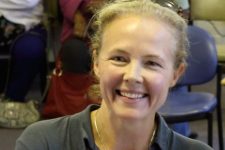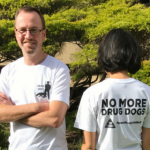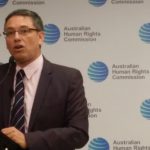Justice Reinvestment, an Exclusive Interview

Sarah Hopkins is the Managing Lawyer of Justice Projects at the Aboriginal Legal Service, and a criminal law lecturer at the University of NSW. In 2012, she helped establish Just Reinvest NSW, a non-profit organisation that’s lobbying for big changes in the way communities interact with the criminal justice system.
“I was working in the children’s court, and everyday magistrates were saying to me: ‘there’s not enough options here in terms of diversionary programs or alternatives to custody’, and it was just something that hit home with me. Our criminal justice system is failing Aboriginal children and young people… I got together with a few other people who were working with Aboriginal kids in the criminal justice system and we started looking at alternatives.”
In 2014 Just Reinvest NSW started their Bourke justice reinvestment project, one of the first such trials in Australia, in the small community of Bourke in north-west NSW.
She sat down with Sydney Criminal Lawyers® earlier this week to talk about justice reinvestment, and the success of her group’s work in Bourke.
What lead to you setting up Just Reinvest NSW?
I’d been working with Aboriginal kids and young people in the criminal justice system for a number of years. When you look at our criminal justice system, and the overrepresentation of Aboriginal children and young people, it’s really shameful. I realised we needed to try and do something to bring about systemic change, rather than just appearing in court day after day.
Justice reinvestment is about shifting resources out of the prison system, and the criminal justice system, and putting them into crime prevention and early intervention. It’s a place based approach that looks at using data to determine what communities have the highest levels of offending and incarceration, and therefore the highest cost to government, and also using data to look at what’s happening in those communities.
So we look at early childhood, education, mental health, and drug and alcohol programs, and support the community in identifying what the problems actually are – and of course what the solutions are.
How does justice reinvestment differ from traditional crime prevention programs?
The important distinction here is that justice reinvestment isn’t just about a single program or intervention, it’s a holistic community approach. It’s about community capacity building, so that the community is engaged and mobilised and can determine its own strategies.
In Bourke, where we’re running a trial site, we looked at the data and the community identified that the summer period was really the biggest problem in terms of kids getting into trouble. It’s school holidays, it’s hot, and there’s a lack of structured activities. In January, a number of different agencies got together and created a summer holiday program that involved a whole lot of youth workers working after hours, and introducing a lot more activities for kids and young people over summer. As a result of that, key crime categories like domestic violence and malicious damage were the lowest they’d been in five years.
The benefit of justice reinvestment is that it provides a long term framework to ensure that we have programs that are working, and to ensure those programs are funded on a long term basis. What we’ve seen, year after year, is a lack of certainty around funding, and certainly a lack of transparency and evaluation. Justice reinvestment addresses those issues and becomes a vehicle for lasting social change.
Why has your organisation decided to focus on Indigenous youth?
Aboriginal juveniles are the most incarcerated group of people in every state across Australia, more than 50 per cent of children in juvenile detention are Aboriginal even though they only constitute around 3 per cent of the population.
I think there’s a complex matrix of reasons for why Aboriginal young people are embroiled in the criminal justice system. Those reasons relate to the criminal justice system itself, a lack of fairness in terms of the availability of alternatives to full time custody, and over policing. But there’s also entrenched socio-economic issues, and issues around intergenerational trauma. The benefit of justice reinvestment is that it’s not a single program, it’s not just about keeping kids in school, or dealing with drug and alcohol problems, it looks at the whole life course of young people and develops a holistic response to those issues.
You mentioned Bourke earlier, what other plans does Just Reinvest NSW have for the future?
This year we’re looking at implementation of the plan the Aboriginal community have developed in Bourke. They’ve focused on three key areas and set goals, targets and strategies to reduce youth offending and build alternative pathways for children and young people. We’ll be working with both the New South Wales and Federal government on that plan, and that will require Government to start looking at a different way of doing business. It’s an innovative process that involves flexible funding, data sharing, strategic learning and authentic engagement with the community. We’re hoping we’ll see a full implementation of that plan in Bourke that over the next three years, and then we’ll be looking at extending that to other communities.
Thank you for your time.
Receive all of our articles weekly
Author






